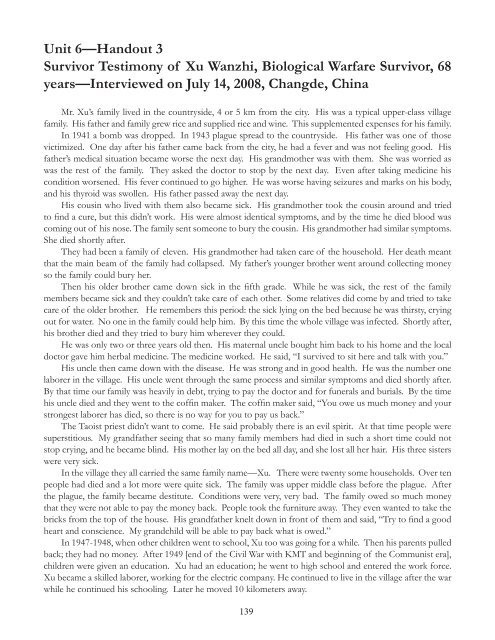Download - Canada ALPHA
Download - Canada ALPHA
Download - Canada ALPHA
Create successful ePaper yourself
Turn your PDF publications into a flip-book with our unique Google optimized e-Paper software.
Unit 6—Handout 3<br />
Survivor Testimony of Xu Wanzhi, Biological Warfare Survivor, 68<br />
years—Interviewed on July 14, 2008, Changde, China<br />
Mr. Xu’s family lived in the countryside, 4 or 5 km from the city. His was a typical upper-class village<br />
family. His father and family grew rice and supplied rice and wine. This supplemented expenses for his family.<br />
In 1941 a bomb was dropped. In 1943 plague spread to the countryside. His father was one of those<br />
victimized. One day after his father came back from the city, he had a fever and was not feeling good. His<br />
father’s medical situation became worse the next day. His grandmother was with them. She was worried as<br />
was the rest of the family. They asked the doctor to stop by the next day. Even after taking medicine his<br />
condition worsened. His fever continued to go higher. He was worse having seizures and marks on his body,<br />
and his thyroid was swollen. His father passed away the next day.<br />
His cousin who lived with them also became sick. His grandmother took the cousin around and tried<br />
to fi nd a cure, but this didn’t work. His were almost identical symptoms, and by the time he died blood was<br />
coming out of his nose. The family sent someone to bury the cousin. His grandmother had similar symptoms.<br />
She died shortly after.<br />
They had been a family of eleven. His grandmother had taken care of the household. Her death meant<br />
that the main beam of the family had collapsed. My father’s younger brother went around collecting money<br />
so the family could bury her.<br />
Then his older brother came down sick in the fi fth grade. While he was sick, the rest of the family<br />
members became sick and they couldn’t take care of each other. Some relatives did come by and tried to take<br />
care of the older brother. He remembers this period: the sick lying on the bed because he was thirsty, crying<br />
out for water. No one in the family could help him. By this time the whole village was infected. Shortly after,<br />
his brother died and they tried to bury him wherever they could.<br />
He was only two or three years old then. His maternal uncle bought him back to his home and the local<br />
doctor gave him herbal medicine. The medicine worked. He said, “I survived to sit here and talk with you.”<br />
His uncle then came down with the disease. He was strong and in good health. He was the number one<br />
laborer in the village. His uncle went through the same process and similar symptoms and died shortly after.<br />
By that time our family was heavily in debt, trying to pay the doctor and for funerals and burials. By the time<br />
his uncle died and they went to the coffi n maker. The coffi n maker said, “You owe us much money and your<br />
strongest laborer has died, so there is no way for you to pay us back.”<br />
The Taoist priest didn’t want to come. He said probably there is an evil spirit. At that time people were<br />
superstitious. My grandfather seeing that so many family members had died in such a short time could not<br />
stop crying, and he became blind. His mother lay on the bed all day, and she lost all her hair. His three sisters<br />
were very sick.<br />
In the village they all carried the same family name—Xu. There were twenty some households. Over ten<br />
people had died and a lot more were quite sick. The family was upper middle class before the plague. After<br />
the plague, the family became destitute. Conditions were very, very bad. The family owed so much money<br />
that they were not able to pay the money back. People took the furniture away. They even wanted to take the<br />
bricks from the top of the house. His grandfather knelt down in front of them and said, “Try to fi nd a good<br />
heart and conscience. My grandchild will be able to pay back what is owed.”<br />
In 1947-1948, when other children went to school, Xu too was going for a while. Then his parents pulled<br />
back; they had no money. After 1949 [end of the Civil War with KMT and beginning of the Communist era],<br />
children were given an education. Xu had an education; he went to high school and entered the work force.<br />
Xu became a skilled laborer, working for the electric company. He continued to live in the village after the war<br />
while he continued his schooling. Later he moved 10 kilometers away.<br />
139


